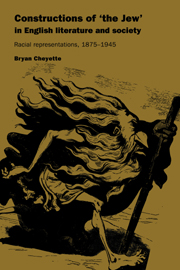Book contents
- Frontmatter
- Contents
- Preface
- Acknowledgements
- 1 Introduction: semitism and the cultural realm
- 2 The promised land of liberalism: Matthew Arnold, Anthony Trollope and George Eliot
- 3 Empire and anarchy: John Buchan and Rudyard Kipling
- 4 The ‘socialism of fools’: George Bernard Shaw and H. G. Wells
- 5 The limits of liberalism: Hilaire Belloc and G. K. Chesterton
- 6 Modernism and ambivalence: James Joyce and T. S. Eliot
- 7 Conclusion: semitism and the crisis of representation
- Bibliography
- Index
5 - The limits of liberalism: Hilaire Belloc and G. K. Chesterton
Published online by Cambridge University Press: 19 October 2009
- Frontmatter
- Contents
- Preface
- Acknowledgements
- 1 Introduction: semitism and the cultural realm
- 2 The promised land of liberalism: Matthew Arnold, Anthony Trollope and George Eliot
- 3 Empire and anarchy: John Buchan and Rudyard Kipling
- 4 The ‘socialism of fools’: George Bernard Shaw and H. G. Wells
- 5 The limits of liberalism: Hilaire Belloc and G. K. Chesterton
- 6 Modernism and ambivalence: James Joyce and T. S. Eliot
- 7 Conclusion: semitism and the crisis of representation
- Bibliography
- Index
Summary
[T]here is no such thing as a Catholic ‘aspect’ of European history. There is a Protestant aspect, a Jewish aspect, a Mohammedan aspect, a Japanese aspect, and so forth. For all of these look on Europe from without. The Catholic sees Europe from within. There is no more a Catholic ‘aspect’ of European history than there is a man's ‘aspect’ of himself.
Hilaire Belloc, Europe and the Faith (London, 1920), p. 3There is an attitude for which my friends and I were for a long period rebuked and even reviled; and of which at the present period we are less likely than ever to repent. It was always called Anti-Semitism; but it was always much more true to call it Zionism. … [M]y friends and I had in some general sense a policy in the matter; and it was in substance the desire to give Jews the dignity and status of a separate nation. We desired that in some fashion, and so far as possible, Jews should be represented by Jews, should live in a society of Jews, should be judged by Jews and ruled by Jews. I am an Anti-Semite if that is Anti-Semitism. It would seem more rational to call it Semitism.
G. K. Chesterton, The New Jerusalem (London, 1920), pp. 264–5INTRODUCTION
The fiction and social criticism of Hilaire Belloc and G. K. Chesterton can be said to accentuate many of the contradictions and ambivalences within Edwardian liberalism.
- Type
- Chapter
- Information
- Constructions of 'the Jew' in English Literature and SocietyRacial Representations, 1875–1945, pp. 150 - 205Publisher: Cambridge University PressPrint publication year: 1993



